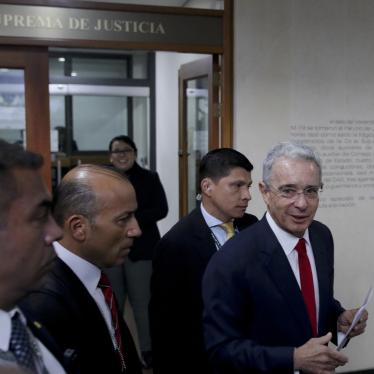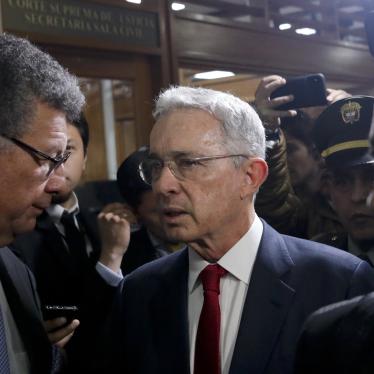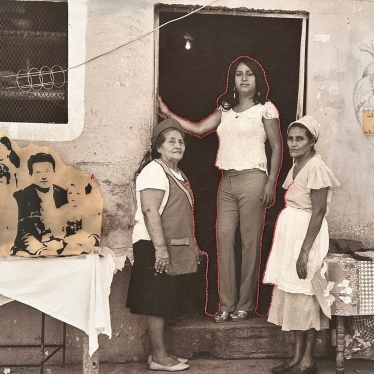On August 21, 2020, José Miguel Vivanco sent the following letter to 21 former presidents of Spain and countries in Latin America. Those presidents had signed an August 10, 2020 statement by the Democratic Initiative of Spain and the Americas (IDEA) criticizing the pretrial house arrest of former president of Colombia Álvaro Uribe Vélez. The former presidents are: Óscar Arias, José María Aznar, Nicolás Ardito Barletta, Enrique Bolaños, Felipe Calderón, Rafael Ángel Calderón, Alfredo Cristiani, Vicente Fox, Lucio E. Gutiérrez, Osvaldo Hurtado, Luis Alberto Lacalle, Mauricio Macri, Jamil Mahuad W., Ricardo Martinelli, Mireya Moscoso, Gustavo Noboa Bejarano, Andrés Pastrana, Ernesto Pérez Balladares, Jorge Tuto Quiroga, Miguel Ángel Rodríguez, Juan Carlos Wasmosy.
The letter has not been updated since August 21, 2020.
Dear former president,
I am writing to express my surprise and dismay over the recent statement by the Democratic Initiative of Spain and the Americas (IDEA), which you signed, criticizing the pretrial house arrest of former president of Colombia Álvaro Uribe Vélez.[1] The statement contains numerous factual and legal mistakes that feed into a campaign to undermine the independence of the judiciary in Colombia.
First, the statement indicates that former President Uribe was detained “in connection with a political controversy involving another Senator from Colombia, which has been taken to the courts.” This statement is imprecise. Former President Uribe was detained as part of a judicial investigation for the crimes of “bribery of witnesses” and “procedural fraud” in the context of an alleged manipulation of witnesses.[2] This is not a political controversy.
It is important to highlight that the case began after former President Uribe filed a criminal complaint against Senator Iván Cepeda, contending that he had received and used “fraudulent” testimony to implicate Uribe and his brother Santiago in atrocities committed by paramilitary groups in the 1990s.[3] In 2018, after six years of investigation, the Supreme Court rejected Uribe’s allegations against Cepeda, finding them to be baseless, and instead initiated an investigation into whether Uribe had tampered with witnesses by pressuring them to say that Cepeda had bribed them to implicate the former president.[4]
Second, the statement you signed notes that former members of the Revolutionary Armed Forces of Colombia (FARC) guerrillas, currently a political party, “celebrate as an achievement” the house arrest of former President Uribe. It is true that former members of the FARC celebrated the court ruling.[5] In the same way, a large part of the Colombian society has expressed its support for the decision.[6] Every judicial decision has supporters and detractors. However, the role of courts is to decide on the basis of the evidence and the law. The statement that you signed focuses on an alleged ideologization of justice in a vague and unfounded way, apparently without having even reviewed the court’s legal analysis of the case. Former President Uribe has valuable judicial resources at his disposal against this decision but has so far decided not to interpose them, giving the impression that he believes he has a better chance of achieving his objectives through political pressure and intimidation than by defending himself through the legal process.[7]
Third, the IDEA statement compares the court ruling concerning former President Uribe with the Supreme Court's decision to order the release of “Jesús Santrich”—a former FARC commander who has a pending United States extradition request on drug trafficking charges and has formed a new armed group. I fully share your concern for Jesús Santrich’s role in serious crimes, and I hope Colombian authorities will promptly arrest and hold him accountable.
However, the comparison of the Santrich case with Uribe’s case is not well-founded. Santrich was released because he had been investigated and arrested by an entity without legal jurisdiction over the case.[8] On the other hand, former President Uribe is being investigated by the appropriate entity according to his status as a senator (that is, the Supreme Court of Justice), and the decision to place him under house arrest is based on evidence that he could interfere with the judicial process currently in progress—an assessment that the former president has not questioned through the legal channels available to him under Colombian law.[9] Also, another flaw in the statement you signed is that it gives the false impression that both rulings were issued out by the same entity, when in reality they were made by two independent chambers with completely different compositions.[10]
Fourth, the statement you signed quotes President Iván Duque, who stated that: “A person who has had the honor of presiding over this country should be able to defend himself while free.” However, according to Colombian regulations currently in force, former presidents do not enjoy such prerogative or immunity. Under Colombian law, any former president, like any other citizen, may be subject to pretrial detention when such measure is necessary to ensure their appearance in a criminal proceeding or to preserve evidence.[11] As you know, the principle of equality before the law is a cornerstone of the rule of law in a democratic society.
Finally, the statement you signed does not help to strengthen the rule of law in Colombia. On the contrary, it encourages the ongoing attacks of former president Uribe and his political party against judicial independence in the country. Following the announcement of the Supreme Court decision, Uribe and his allies in Congress have revived a proposal for constitutional reform to modify the operation of the country’s high courts.[12] Specifically, lawmakers propose unifying all the high courts into a single court, a move that could pose enormous risks to judicial independence. This is a shameless attempt to intimidate the Supreme Court through the threat of judicial reform—a maneuver some governments in the region have also used in the past.
In accordance with international human rights standards, Colombia needs to protect the independence and impartiality of the judicial system. Judges should be free from constraints, pressure, threats, or interference, direct or indirect, and should have security of tenure so they do not fear being removed from their posts for their decisions.
In recent years, political polarization has created an environment where the manipulation of information has been used to damage the rule of law and its institutions. I hope that you will take this letter into account and reconsider your support of the IDEA statement.
Respectfully,
José Miguel Vivanco
Human Rights Watch
[1] Democratic Initiative of Spain and the Americas (IDEA), “Statement of Solidarity with Former President Álvaro Uribe” (“Declaración de solidaridad con el expresidente Álvaro Uribe”), August 10, 2020.
[2] Colombian Supreme Court of Justice, Special Chamber of Investigation, Judge César Augusto Reyes Medina, August 3, 2020 decision, File No. 52,240.
[3] Colombian Supreme Court of Justice, Criminal Chamber, Judge José Luis Barceló, February 16, 2018 decision, File No. 38,451.
[4] Ibid.
[5] See, for example, FARC Party tweet from August 4, 2020, https://twitter.com/PartidoFARC/status/1290719075824435210?s=20 (accessed August 19, 2020).
[6] See, for example, “53% of respondents agree with the decision of the Court in the Uribe case” (“El 53 % de encuestados está de acuerdo con la decisión de la Corte en caso Uribe”), Revista Semana, August 14, 2020, https://www.semana.com/nacion/articulo/el-53-por-ciento-esta-de-acuerdo-con-la-decision-de-la-corte-en-el-caso-uribe/694210 (accessed August 19, 2020).
[7] “Statement to public opinion by the defense of Mr. President Álvaro Uribe" (“Comunicado a la opinión pública de la defensa del señor Presidente Alvaro Uribe”), August 12, 2020, https://twitter.com/JGranadosPena/status/1293309300576845825?s=20 (accessed August 19, 2020).
[8] Colombian Supreme Court of Justice, Criminal Chamber, Judge Eugenio Fernández Carlier, May 29, 2019 decision, File No. 55.395.
[9] Colombian Supreme Court of Justice, Special Chamber of Investigation, Judge César Augusto Reyes Medina, August 3, 2020 decision, File No. 52.240.
[10] The decision about former President Uribe was adopted by the Special Chamber of Investigation of the Supreme Court, while the decision about Santrich was made by the Criminal Chamber. See Colombian Supreme Court of Justice, Criminal Chamber, Judge Eugenio Fernández Carlier, May 29, 2019 decision, File No. 55,395. See also: “Judges” (“Magistrados integrantes”), Colombian Supreme Court of Justice, no date, https://cortesuprema.gov.co/corte/index.php/magistrados-integrantes/ (accessed August 19, 2020).
[11] Constitution of Colombia, article 235; Law 600 of 2000, article 365; Law 906 of 2004, article 309.
[12] See, for example, Democratic Center, “Statement to the Public Opinion,” August 4, 2020, https://twitter.com/CeDemocratico/status/1290836053750931456/photo/1 (accessed August 19, 2020); “'I feel like I'm kidnapped': Álvaro Uribe Vélez talks about his arrest” (“‘Siento que estoy secuestrado’: Álvaro Uribe Vélez habla de su detención”), Revista Semana, August 16, 2020, https://www.semana.com/nacion/articulo/alvaro-uribe-primera-entrevista-desde- his-home-detention - news-today / 694854 (accessed August 19, 2020).








